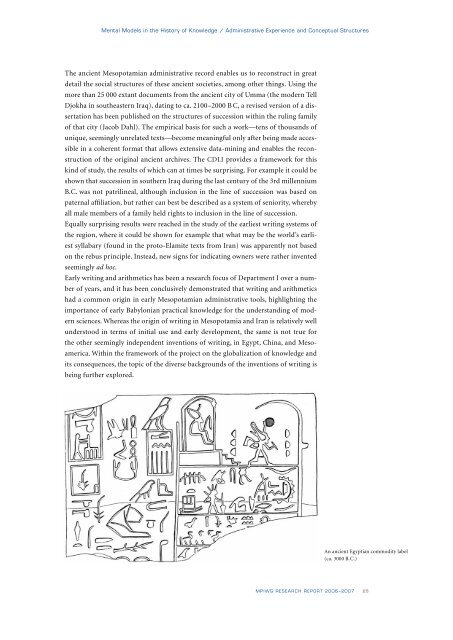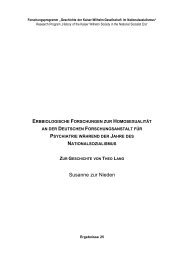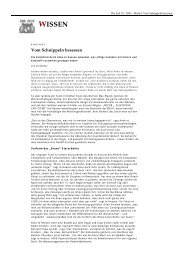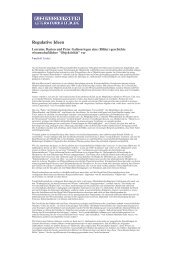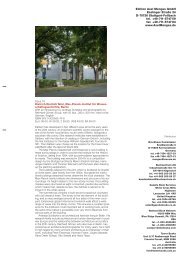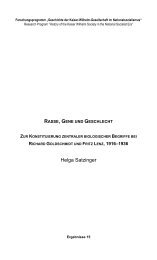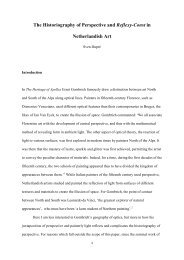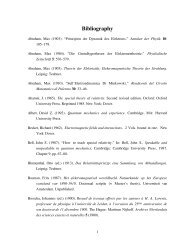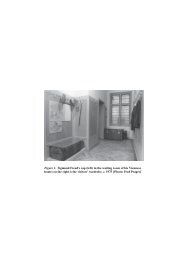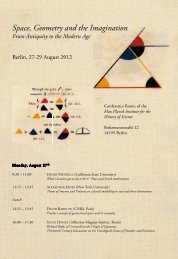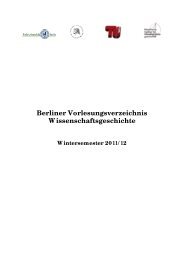Max Planck Institute for the History of Science
Max Planck Institute for the History of Science
Max Planck Institute for the History of Science
Create successful ePaper yourself
Turn your PDF publications into a flip-book with our unique Google optimized e-Paper software.
Mental Models in <strong>the</strong> history <strong>of</strong> Knowledge / administrative experience and conceptual structures<br />
The ancient Mesopotamian administrative record enables us to reconstruct in great<br />
detail <strong>the</strong> social structures <strong>of</strong> <strong>the</strong>se ancient societies, among o<strong>the</strong>r things. Using <strong>the</strong><br />
more than 25 000 extant documents from <strong>the</strong> ancient city <strong>of</strong> Umma (<strong>the</strong> modern Tell<br />
Djokha in sou<strong>the</strong>astern Iraq), dating to ca. 2100–2000 B C, a revised version <strong>of</strong> a dissertation<br />
has been published on <strong>the</strong> structures <strong>of</strong> succession within <strong>the</strong> ruling family<br />
<strong>of</strong> that city (Jacob Dahl). The empirical basis <strong>for</strong> such a work—tens <strong>of</strong> thousands <strong>of</strong><br />
unique, seemingly unrelated texts—become meaningful only after being made accessible<br />
in a coherent <strong>for</strong>mat that allows extensive data-mining and enables <strong>the</strong> reconstruction<br />
<strong>of</strong> <strong>the</strong> original ancient archives. The CDLI provides a framework <strong>for</strong> this<br />
kind <strong>of</strong> study, <strong>the</strong> results <strong>of</strong> which can at times be surprising. For example it could be<br />
shown that succession in sou<strong>the</strong>rn Iraq during <strong>the</strong> last century <strong>of</strong> <strong>the</strong> 3rd millennium<br />
B. C. was not patrilineal, although inclusion in <strong>the</strong> line <strong>of</strong> succession was based on<br />
paternal affiliation, but ra<strong>the</strong>r can best be described as a system <strong>of</strong> seniority, whereby<br />
all male members <strong>of</strong> a family held rights to inclusion in <strong>the</strong> line <strong>of</strong> succession.<br />
Equally surprising results were reached in <strong>the</strong> study <strong>of</strong> <strong>the</strong> earliest writing systems <strong>of</strong><br />
<strong>the</strong> region, where it could be shown <strong>for</strong> example that what may be <strong>the</strong> world’s earliest<br />
syllabary (found in <strong>the</strong> proto-Elamite texts from Iran) was apparently not based<br />
on <strong>the</strong> rebus principle. Instead, new signs <strong>for</strong> indicating owners were ra<strong>the</strong>r invented<br />
seemingly ad hoc.<br />
Early writing and arithmetics has been a research focus <strong>of</strong> Department I over a number<br />
<strong>of</strong> years, and it has been conclusively demonstrated that writing and arithmetics<br />
had a common origin in early Mesopotamian administrative tools, highlighting <strong>the</strong><br />
importance <strong>of</strong> early Babylonian practical knowledge <strong>for</strong> <strong>the</strong> understanding <strong>of</strong> modern<br />
sciences. Whereas <strong>the</strong> origin <strong>of</strong> writing in Mesopotamia and Iran is relatively well<br />
understood in terms <strong>of</strong> initial use and early development, <strong>the</strong> same is not true <strong>for</strong><br />
<strong>the</strong> o<strong>the</strong>r seemingly independent inventions <strong>of</strong> writing, in Egypt, China, and Mesoamerica.<br />
Within <strong>the</strong> framework <strong>of</strong> <strong>the</strong> project on <strong>the</strong> globalization <strong>of</strong> knowledge and<br />
its consequences, <strong>the</strong> topic <strong>of</strong> <strong>the</strong> diverse backgrounds <strong>of</strong> <strong>the</strong> inventions <strong>of</strong> writing is<br />
being fur<strong>the</strong>r explored.<br />
An ancient Egyptian commodity label<br />
(ca. 3000 B.C.)<br />
MPIWG ReseaRch RePoRt 2006– 2007 25


